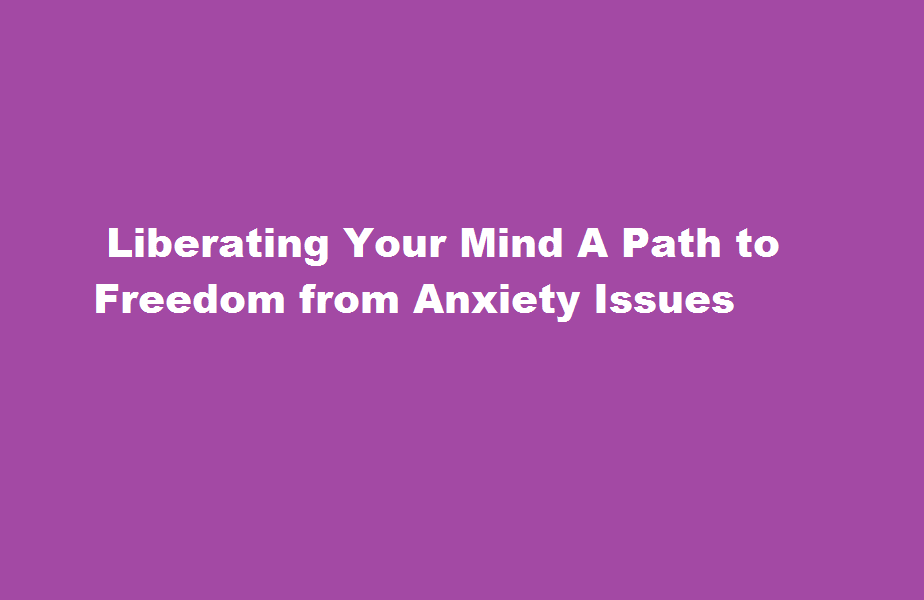Liberating Your Mind A Path to Freedom from Anxiety Issues
3 min read
Introduction
In today’s fast-paced world, anxiety has become a common experience for many individuals. It can be overwhelming and debilitating, affecting various aspects of life. However, there is hope. By understanding the nature of anxiety and implementing effective strategies, it is possible to break free from its grip and regain a sense of peace and well-being. In this article, we will explore practical steps you can take to liberate yourself from anxiety and cultivate a more fulfilling life.
Understanding Anxiety
Anxiety is a normal human response to perceived threats or stressful situations. However, when anxiety becomes excessive or irrational, it can evolve into an anxiety disorder. It often manifests as persistent worry, restlessness, irritability, and physical symptoms like rapid heartbeat and difficulty breathing. To address anxiety effectively, it’s crucial to recognize its triggers and underlying causes. These may include genetic predisposition, traumatic experiences, chronic stress, or certain medical conditions. Seeking professional help from a therapist or counsellor can provide valuable insights into your specific anxiety issues and guide you toward tailored solutions.
Building a Strong Foundation
To break free from anxiety, it’s important to establish a solid foundation for your mental well-being. This includes adopting a healthy lifestyle that incorporates regular exercise, adequate sleep, and a balanced diet. Physical activity releases endorphins, which can improve your mood and reduce anxiety. Prioritise self-care activities that promote relaxation, such as meditation, deep breathing exercises, or engaging in hobbies you enjoy. Additionally, nurturing positive relationships and a strong support system can provide emotional stability and reassurance during challenging times.
Mindfulness and Cognitive Restructuring
Practising mindfulness can significantly help in managing anxiety. Mindfulness involves paying attention to the present moment without judgement. By cultivating mindfulness, you can train your mind to observe anxious thoughts and emotions without becoming overwhelmed by them. Mindfulness-based techniques, such as meditation and yoga, can increase self-awareness and foster a sense of calm.
Cognitive restructuring is another powerful tool to overcome anxiety. It involves challenging and reframing negative thought patterns. Start by identifying the distorted thoughts that fuel anxiety and examine the evidence that supports or contradicts them. Replace negative self-talk with positive and realistic affirmations. Over time, this practice can rewire your brain to think more rationally and reduce anxiety.
Stress Management Techniques
Since stress is a significant contributor to anxiety, learning effective stress management techniques is crucial. Consider incorporating activities like journaling, listening to music, or engaging in hobbies that promote relaxation. Developing time management skills and setting realistic goals can also help reduce stress levels. Additionally, consider utilising techniques such as progressive muscle relaxation or guided imagery to induce a state of calmness.
Seeking Professional Help
If anxiety significantly interferes with your daily life or persists despite your efforts, it is essential to seek professional help. Mental health professionals can provide guidance and support, offering specialised therapies like cognitive-behavioural therapy (CBT) or medication if necessary. They can also help you identify and address any underlying issues contributing to your anxiety.
Frequently Asked Questions
What are the 4 coping skills for anxiety?
The Coping Skills: Anxiety worksheet describes four strategies for reducing anxiety. Strategies include deep breathing, progressive muscle relaxation, imagery, and challenging irrational thoughts
What is the 3 3 3 rule for anxiety?
It involves looking around your environment to identify three objects and three sounds, then moving three body parts. Many people find this strategy helps focus and ground them when anxiety overwhelms them.
Conclusion
While anxiety may feel overwhelming, it doesn’t have to define your life. By understanding anxiety, adopting healthy habits, practising mindfulness, restructuring your thoughts, managing stress, and seeking professional help when needed, you can break free from its grip. Remember, progress takes time, so be patient and kind to yourself during the journey to liberation. Embrace the strategies outlined in this article and empower yourself to reclaim control over your mental well-being. You deserve a life free from anxiety, filled with peace and fulfilment.
Read Also : Streamlining Communication A Guide to Enabling Call Forwarding






